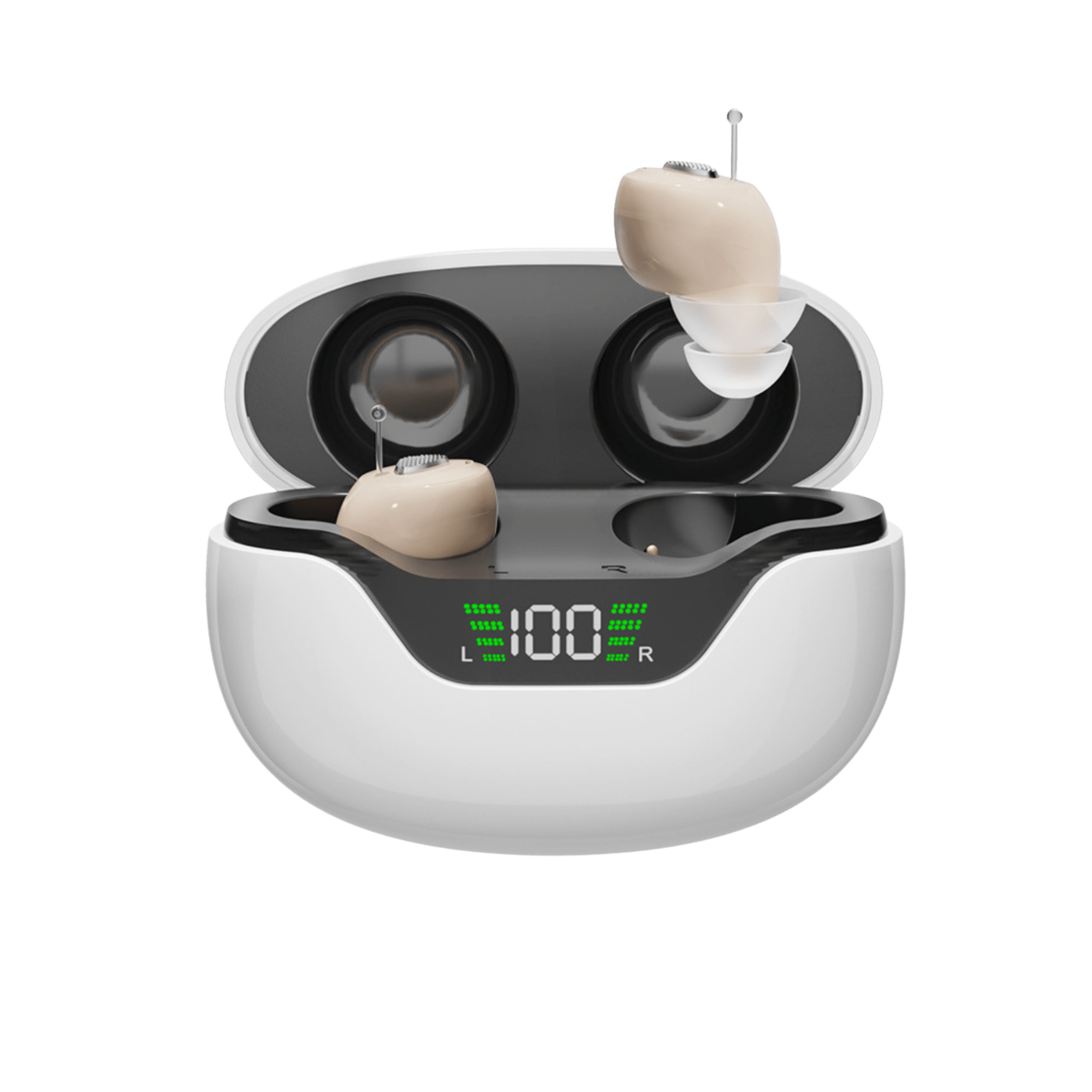We tend to take our ability to hear for granted since we live in a world that is rich with a variety of sounds, ranging from the gentle rustling of leaves to the melodious tones of music and the cherished voices of those we care about. On the other hand, other people have a harder time hearing or don't pick up on these noises at all. Hearing impairment, often known as hearing loss, affects a sizeable section of the population and has the potential to have a considerable negative effect on one's quality of life. In this article, we look into the reasons why some people have hearing impairments, providing light on the numerous causes and risk factors linked with this frequent ailment. Hearing impairments can range from mild to profound, depending on the severity of the problem.
The Orchestration of Sound: How It All Comes Together
It is necessary to first get an understanding of how hearing works in order to comprehend the reasons why some people experience hearing loss. In a nutshell, sound waves reach the outer ear and go to the eardrum via the ear canal after passing through the canal. The eardrum is made to vibrate whenever these waves come into contact with it. After that, the vibrations are sent to the very small bones that make up the middle ear, where they are amplified before being sent on to the inner ear. Here, the spiral-shaped organ known as the cochlea, which is filled with fluid and hair cells, is responsible for converting these vibrations into electrical impulses. These signals are then carried by the auditory nerve to the brain, where they are interpreted as sound.
The Causes of Hearing Loss Presented in "The Silent World"
It's possible for difficulties to arise at any stage along this road, leading to hearing loss. Let's look at the most important categories and what causes them.
Hearing loss caused by conductivity
Conductive hearing loss is characterized by an inability of sound to effectively travel from the external auditory canal to the ossicles and eardrum of the middle ear. Conditions like as ear infections, fluid buildup in the middle ear, impacted earwax, a ruptured eardrum, and abnormalities of the outer or middle ear structures can all contribute to this issue.
Loss of Sensation in the Inner Ear
Problems in the cochlea or the auditory nerve are the most prevalent causes of sensorineural hearing loss, which is also the most common kind of hearing loss. This can be caused by damage to the hair cells in the cochlea, which is typically the result of becoming older, being exposed to loud noise, taking particular drugs, or having a variety of conditions. Many people are born with sensorineural hearing loss as a result of hereditary diseases, demonstrating that genetic factors can also play a crucial role.
Loss of hearing in both ears
A mixture of conductive and sensorineural hearing loss is known as mixed hearing loss. This type of hearing loss occurs when there are issues in both the middle/outer ear as well as the inner ear.
Raising the Stakes: A Look at Some of the Factors That Can Lead to Hearing Loss
Although it is possible for anybody to develop hearing loss, there are a number of variables that might raise the risk.
Presbycusis, also known as age-related hearing loss, is a prevalent illness that affects people who are in their later years. The number of hair cells in our cochlea naturally begins to decrease as we get older, which results in a progressive loss of hearing as we age.
Noise Exposure
Hearing loss is a common condition that can be brought on by prolonged exposure to loud noise. Hearing loss caused by noise can be the result of a single, acute sound experience or of prolonged exposure to loud noises over a period of time. Both scenarios have the potential to cause noise-induced hearing loss.
Medications That Are Ototoxic
Ototoxic medicines are those that have the potential to cause harm to the inner ear, which can result in either temporary or permanent hearing loss. There are a few antibiotics, pharmaceuticals used to treat cancer, and large dosages of aspirin that fall within the category of ototoxic substances.
Illnesses
Hearing loss is a symptom that can be caused by a variety of conditions, including meningitis, measles, mumps, and autoimmune disorders. In addition, hearing loss can be caused by illnesses that influence blood circulation, such as diabetes or cardiovascular disease.
Observations to Conclude: Being Aware and Taking Action
Hearing loss may affect people from many areas of life, and the reasons of hearing loss are just as varied as the people who are affected by it. The first step in improving hearing health is gaining an understanding of the factors that contribute to hearing loss in certain individuals. It is necessary to protect our ears from excessive noise, get medical treatment for ear infections, and maintain general good health in order to minimize the negative effects of the risk factors that are under our control.
Hearing screenings should be performed on a routine basis because they play a critical part in the early identification and intervention processes, which in turn ensure that people who have hearing loss may have access to the required assistance and therapies. We can contribute to making the world a place where everyone has equal access to the beautiful symphony of sound by bringing attention to the factors that lead to hearing loss and promoting better hearing health.
The Orchestration of Sound: How It All Comes Together
It is necessary to first get an understanding of how hearing works in order to comprehend the reasons why some people experience hearing loss. In a nutshell, sound waves reach the outer ear and go to the eardrum via the ear canal after passing through the canal. The eardrum is made to vibrate whenever these waves come into contact with it. After that, the vibrations are sent to the very small bones that make up the middle ear, where they are amplified before being sent on to the inner ear. Here, the spiral-shaped organ known as the cochlea, which is filled with fluid and hair cells, is responsible for converting these vibrations into electrical impulses. These signals are then carried by the auditory nerve to the brain, where they are interpreted as sound.
The Causes of Hearing Loss Presented in "The Silent World"
It's possible for difficulties to arise at any stage along this road, leading to hearing loss. Let's look at the most important categories and what causes them.
Hearing loss caused by conductivity
Conductive hearing loss is characterized by an inability of sound to effectively travel from the external auditory canal to the ossicles and eardrum of the middle ear. Conditions like as ear infections, fluid buildup in the middle ear, impacted earwax, a ruptured eardrum, and abnormalities of the outer or middle ear structures can all contribute to this issue.
Loss of Sensation in the Inner Ear
Problems in the cochlea or the auditory nerve are the most prevalent causes of sensorineural hearing loss, which is also the most common kind of hearing loss. This can be caused by damage to the hair cells in the cochlea, which is typically the result of becoming older, being exposed to loud noise, taking particular drugs, or having a variety of conditions. Many people are born with sensorineural hearing loss as a result of hereditary diseases, demonstrating that genetic factors can also play a crucial role.
Loss of hearing in both ears
A mixture of conductive and sensorineural hearing loss is known as mixed hearing loss. This type of hearing loss occurs when there are issues in both the middle/outer ear as well as the inner ear.
Raising the Stakes: A Look at Some of the Factors That Can Lead to Hearing Loss
Although it is possible for anybody to develop hearing loss, there are a number of variables that might raise the risk.
Presbycusis, also known as age-related hearing loss, is a prevalent illness that affects people who are in their later years. The number of hair cells in our cochlea naturally begins to decrease as we get older, which results in a progressive loss of hearing as we age.
Noise Exposure
Hearing loss is a common condition that can be brought on by prolonged exposure to loud noise. Hearing loss caused by noise can be the result of a single, acute sound experience or of prolonged exposure to loud noises over a period of time. Both scenarios have the potential to cause noise-induced hearing loss.
Medications That Are Ototoxic
Ototoxic medicines are those that have the potential to cause harm to the inner ear, which can result in either temporary or permanent hearing loss. There are a few antibiotics, pharmaceuticals used to treat cancer, and large dosages of aspirin that fall within the category of ototoxic substances.
Illnesses
Hearing loss is a symptom that can be caused by a variety of conditions, including meningitis, measles, mumps, and autoimmune disorders. In addition, hearing loss can be caused by illnesses that influence blood circulation, such as diabetes or cardiovascular disease.
Observations to Conclude: Being Aware and Taking Action
Hearing loss may affect people from many areas of life, and the reasons of hearing loss are just as varied as the people who are affected by it. The first step in improving hearing health is gaining an understanding of the factors that contribute to hearing loss in certain individuals. It is necessary to protect our ears from excessive noise, get medical treatment for ear infections, and maintain general good health in order to minimize the negative effects of the risk factors that are under our control.
Hearing screenings should be performed on a routine basis because they play a critical part in the early identification and intervention processes, which in turn ensure that people who have hearing loss may have access to the required assistance and therapies. We can contribute to making the world a place where everyone has equal access to the beautiful symphony of sound by bringing attention to the factors that lead to hearing loss and promoting better hearing health.





